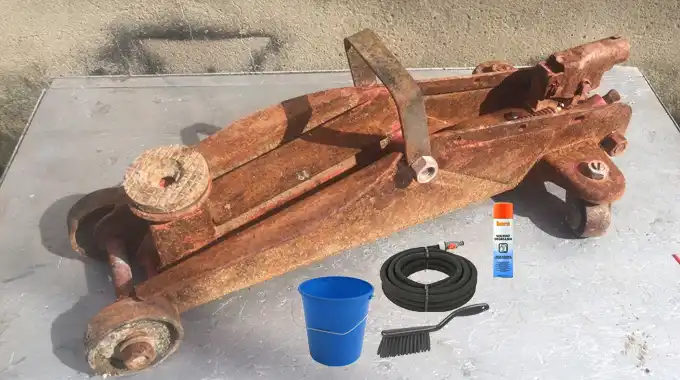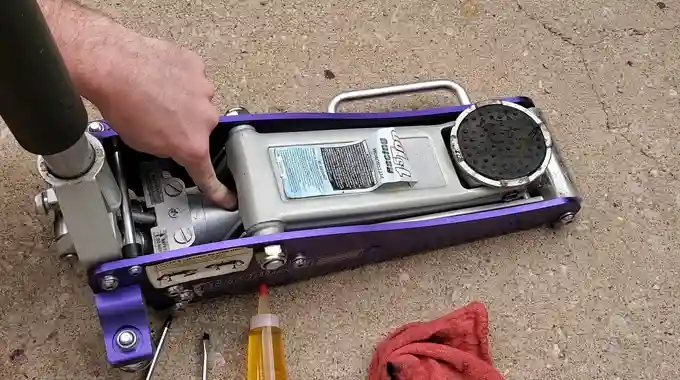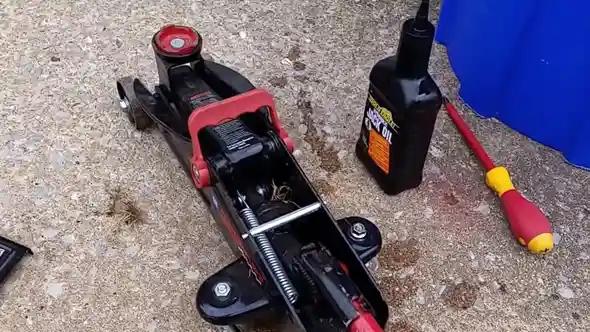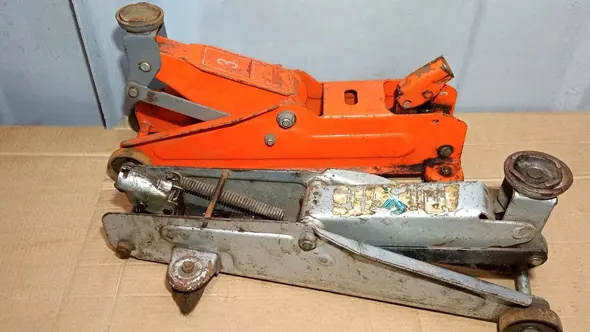Last Updated on April 12, 2023
Over time, a floor jack can become covered in residue, grease, and grime and the build-up can cause the jack to become less stable. The extra weight of the accumulated particles and grime can make the jack more likely to tip over, which could lead to serious injury. Only way to avoid that is to clean the floor jack regularly.
A floor jack is a vital tool for anyone who spends time working on their car. Whether you’re a professional mechanic or a passionate DIYer, having a floor jack in your garage is a must. But like any other tool, a floor jack needs to be properly cared for if you want it to last.
In this blog post, we’ll show you how to clean and maintain your floor jack so that it’s always ready to go when you need it. We will also share related tips on how to keep your floor jack in top shape and provide related answers to our questions.
How to Clean Floor Jack: The To-do List

By carefully following these instructions, you can ensure that your floor jack stays in good condition. So, read on.
Step 1: What You’ll Need
Before you get started, you’ll need to gather the following supplies:
- A bucket
- A garden hose
- A stiff brush
- Degreaser
- Rust remover (if necessary)
- A clean rag
Step 2: Remove Any Debris
Next, you need to remove any loose debris from the surface of the jack. This can be done with a brush or vacuum. Be sure to wipe down the jack’s body and hydraulic pump as well. Also, pay special attention to the crevices and cracks, as these can be breeding grounds for contaminants and grime.
Step 3: Mix Your Solution
Once the surface is clear of debris, it’s time to mix up your cleaning solution. Fill your bucket with warm water and add a generous squirt of degreaser. If there is any rust on your jack, now is also the time to add a rust remover to the mix. Stir everything together until it is well combined.
Step 4: Start Scrubbing
Now comes the fun part. Using your brush, start scrubbing the jack all over, paying special attention to areas that are particularly dirty or greasy. If you’re dealing with rust, make sure that you scrub vigorously enough to remove it completely. Once you’re satisfied that the jack is clean, rinse it off with your garden hose.
Step 5: Refill Jack Oil
Once the surface of the jack is clean, move on to the hydraulic fluid. If your jack uses mineral oil, you can simply top it off as needed. In any case, if your jack uses synthetic hydraulic fluid, you’ll need to drain and replace it every 6 months or so.
Step 6: Drain Old Hydraulic Fluid and Fill With New
To drain the hydraulic fluid, start by placing a drain pan underneath the release valve on the underside of the jack. Then, open the valve and allow the fluid to drain out completely. Once all of the fluid has been drained, close the valve and move on to filling the reservoir with new fluid.
Step 7: Dry Off and Apply Rust Prevention Solution
After rinsing, dry off the jack with a clean rag. If there is any residual rust remaining, apply a rust prevention solution before storing the jack away. There are a variety of solutions on the market, so choose one that is appropriate for the type of jack you have. After the solution has been applied, you should store the jack in a dry place. This will help to prevent rust from forming in the future.
Tips and Advices:
- When adding new fluid, be sure to use the same type that was originally in your jack. Once the reservoir is full, close the fill cap and test the jack to make sure it’s working properly.
- Aside from regularly cleaning and servicing your jack, it’s also important to store it properly when it’s not in use.
- Be sure to keep it out of direct sunlight and away from extreme heat or cold, as this can damage both the body of the jack and the hydraulic components.
- Also, it’s important to keep your floor jack stored upright so that any residual oil doesn’t leak out and damage your garage floor or tools.
Is it Necessary to Oil a Jack When Cleaning It?

As anyone who has ever tried to clean a jack knows, it can be a difficult and time-consuming task. The small size of the pieces and the intricate nature of the mechanism make it difficult to reach all the nooks and crannies where grit and grime can accumulate.
Therefore, many people choose to oil their jacks as part of the cleaning process. Oiling helps to loosen up residue and waste, making it easier to remove. Also, it can help to protect the metal from corrosion and keep the jack working smoothly.
Even so, there are some downsides to oiling a jack. The oil can attract more particles, and it may need to be cleaned more frequently because of this. Also, if too much oil is used, it can seep into the mechanism and cause problems.
As with most things in life, there are pros and cons to oiling a jack when cleaning it. The best course of action is to weigh the options and decide what is best for you and your jack.
How Long Does Hydraulic Jack Fluid Last?

Hydraulic jacks are a vital piece of equipment for many mechanics and car enthusiasts. They rely on a fluid to operate, which is why it’s important to know how long this fluid lasts. The lifespan of hydraulic jack fluid will depend on a few factors, such as the type of fluid and how often it’s used.
One factor that can affect the lifespan of hydraulic jack fluid is the type of fluid used. There are different types of hydraulic fluids, each with its own benefits and drawbacks. Some fluids are designed to last longer than others, so be sure to choose the right one for your needs.
Another factor is how often it’s used. If you frequently use your jack, you may need to replace the fluid more often than someone who only uses it occasionally.
Ultimately, hydraulic jack fluid lifespan will vary depending on the reasons mentioned above. But, in most cases, the fluid will last for several years before needing to be replaced. This makes hydraulic jacks a very reliable piece of equipment for mechanics and car enthusiasts alike.
How Often Should I Re-grease My Jack?
Deciding how often to re-grease your jack is a tricky question. On one hand, you don’t want to overdo it and waste grease. On the other hand, if you don’t grease it enough, the parts can wear out prematurely.
The best way to strike a balance is to use a light grease and apply it sparingly. Once a month should be sufficient for most people. In any case, if you use your jack frequently or in extreme conditions, you may need to grease it more often.
When in doubt, err on the side of caution and grease your jack more often rather than less. With a little patience and attention, your jack should give you years of trouble-free service.
Do Floor Jacks Need Maintenance?

Like any other tool, floor jacks require some basic maintenance in order to function properly. The most important part of maintaining a floor jack is to regularly check the hydraulic fluid level.
Hydraulic fluid helps to lift the load and also acts as a lubricant, so it’s important to keep the level topped up. You should also check the condition of the hydraulic seals, as they can become worn over time and cause leaks. Also, it’s a good idea to clean the jack and apply a light coat of grease to all moving parts.
Conclusion
Cleaning your floor jack is a very important part of maintaining it. By taking the time to clean it on a regular basis, you can ensure that it works properly and lasts for many years.
There are a few different methods that you can use to clean your jack, but the most important thing is to be thorough. Be sure to remove all residue and grime from all of the moving parts, and make sure not to damage any of the seals. With a little bit of diligence, your floor jack will provide you with a lifetime of trouble-free service.
